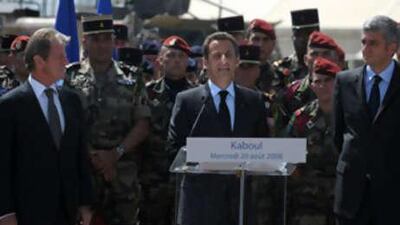The French president Nicolas Sarkozy flew into Kabul today and met survivors of an ambush that killed 10 French troops in the deadliest attack on international forces in post-Taliban Afghanistan. Mr Sarkozy touched down at Kabul airport with his defence minister Herve Morin and the foreign minister Bernard Kouchner and immediately took a helicopter to Camp Warehouse, the base for French troops on the outskirts of the city.
He spent around five minutes in a mortuary holding the coffins of soldiers killed in the fighting about 50km east of Kabul on Monday and Tuesday. Mr Sarkozy also went to the camp hospital and spoke to 10 of the wounded before meeting some of the other paratroopers involved in what he has described as "an extremely violent ambush". He told about 300 French troops at the camp: "I have seen among you some people crying. I understand, I have told you that I share your pain and these are not just words, otherwise I would not be here." He was due to hold talks with Michel Stollsteiner, a French general who is head of troops serving in Nato's International Security Assistance Force in Kabul and surrounds.
After a minutes silence the French premier left to meet President Hamid Karzai. Monday's bloodshed came after the militants ambushed a reconnaissance patrol from three sides. Air support was then called in to rescue the units. Analysts have described the attack as a "wake-up call" for the international community that the insurgents were gaining in strength and audacity.
Before he left France, Mr Sarkozy said that his visit was to show the troops that "France is at their side." "In its struggle against terrorism, France has just been hard hit," Mr Sarkozy said. The attack was also the deadliest on French soldiers since a 1983 bombing in Beirut in which 58 paratroopers were killed. But Mr Sarkozy has insisted France would not be deterred from its Afghan mission, for which it has 3,000 soldiers serving in the Isaf ? made up of 53,000 troops from nearly 40 nations.
"This is a just cause, it is an honour for France and for its army to defend it," he said earlier. US forces provided air support in the battle, after which the Taliban said it had destroyed several military vehicles. The French losses drew expressions of sympathy from other countries which have suffered heavy losses in Afghanistan, where extremist violence has grown every year with more foreign and al Qa'eda-linked fighters believed to be involved.
The United States president George W Bush offered his condolences, as did the leaders of Britain and Canada, other key contributors to the Isaf deployment. Nine US soldiers were slain in July when insurgents stormed a base in the northeastern province of Kunar, in another well-planned rebel strike that also involved scores of attacks. Twenty-three French troops have now been killed in action or in accidents in Afghanistan since French soldiers were first sent there in 2002.
Sarkozy, who paid a brief visit to Afghanistan in December, has pushed for an expansion in France's military role despite polls showing public opinion does not support such a move. He announced French reinforcements to Afghanistan at a Nato summit in April ? drawing fierce criticism at home from left-wing opponents who saw the move as a sign of French alignment with US policy. *AFP

